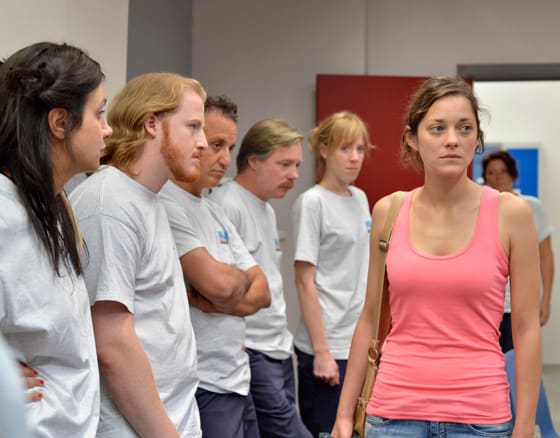After being released from the hospital for depression, Sandra (Marion Cotillard) learns that her job has been eliminated. In her absence, management held a vote about budget cuts wherein the option to sacrifice year-end bonuses in exchange for Sandra's job was put on the table. Unsurprisingly, the majority voted to maintain their bonus structure.
What the Dardennes posit with Two Days, One Night, yet another exceptional demonstration of their trademark analyses of lower-working class survival and social politics, is what might happen if Sandra were given a second chance. This chance takes place over a weekend — the titular two days and one night — wherein our soft-spoken, somewhat defeated protagonist is pushed into seeking out all her co-workers to ask them to vote in her favour at a secret ballot on Monday morning.
Initially, her efforts are mostly positive. A couple of co-workers are honest with her, pointing out why they can't sacrifice their bonus, but others are sympathetic to her struggle and offer to support her. The reason for this is obvious: it's inevitable that Sandra would approach the people she's most comfortable with first. As her quest continues — one that her husband (Fabrizio Rongione) forces upon her — she encounters hostility, tears and even violence. What's worse is that once word gets out that Sandra is canvassing for her job, those looking to oust her resort to intimidation tactics to sway the votes of those indicating support for their colleague.
There's nothing about Two Days, One Night that feels contrived. The Dardennes use their usual loose, observant style — hand-held photography and long single takes of conversations — to document a litany of awkward conversations and the gradual, devastating emotional exhaustion of Cotillard, who gives yet another layered, complex performance. There's also only diegetic sound in the movie, reiterating the naturalistic sensibilities of directors interested in capturing some sort of social truth.
More than the observation that greed motivates people more often than humanity, there are an abundance of themes floating around about how decisions are made. In a perfect world, each employee would be able to make their decision free from external influence but, as indicated here, there are always voices and forceful opinions influencing the dialogue. Often, the winner of a vote isn't who "the people" think should win, but the person with the most sway and power.
But beyond the very clever tapestry of socio-normative behaviour depicted within this captivating gem is a basic story that compels for the duration. Sandra's quest to keep what appears to be a relatively low-income, shitty job is quite horrifying. This is, in a way, a quiet quest for survival denoted by social etiquettes, guilt and human selfishness; what's evident is just how thin the layer holding everything together really is. There's a sense that many of the people Sandra approaches for help would sooner shoot her than give up a small piece of what they feel they're entitled to if it weren't for the consequences. It's quite telling, and reiterates the importance of the Dardennes within the filmmaking lexicon.
Unfortunately, no supplements are included with the DVD release.
(Mongrel Media)What the Dardennes posit with Two Days, One Night, yet another exceptional demonstration of their trademark analyses of lower-working class survival and social politics, is what might happen if Sandra were given a second chance. This chance takes place over a weekend — the titular two days and one night — wherein our soft-spoken, somewhat defeated protagonist is pushed into seeking out all her co-workers to ask them to vote in her favour at a secret ballot on Monday morning.
Initially, her efforts are mostly positive. A couple of co-workers are honest with her, pointing out why they can't sacrifice their bonus, but others are sympathetic to her struggle and offer to support her. The reason for this is obvious: it's inevitable that Sandra would approach the people she's most comfortable with first. As her quest continues — one that her husband (Fabrizio Rongione) forces upon her — she encounters hostility, tears and even violence. What's worse is that once word gets out that Sandra is canvassing for her job, those looking to oust her resort to intimidation tactics to sway the votes of those indicating support for their colleague.
There's nothing about Two Days, One Night that feels contrived. The Dardennes use their usual loose, observant style — hand-held photography and long single takes of conversations — to document a litany of awkward conversations and the gradual, devastating emotional exhaustion of Cotillard, who gives yet another layered, complex performance. There's also only diegetic sound in the movie, reiterating the naturalistic sensibilities of directors interested in capturing some sort of social truth.
More than the observation that greed motivates people more often than humanity, there are an abundance of themes floating around about how decisions are made. In a perfect world, each employee would be able to make their decision free from external influence but, as indicated here, there are always voices and forceful opinions influencing the dialogue. Often, the winner of a vote isn't who "the people" think should win, but the person with the most sway and power.
But beyond the very clever tapestry of socio-normative behaviour depicted within this captivating gem is a basic story that compels for the duration. Sandra's quest to keep what appears to be a relatively low-income, shitty job is quite horrifying. This is, in a way, a quiet quest for survival denoted by social etiquettes, guilt and human selfishness; what's evident is just how thin the layer holding everything together really is. There's a sense that many of the people Sandra approaches for help would sooner shoot her than give up a small piece of what they feel they're entitled to if it weren't for the consequences. It's quite telling, and reiterates the importance of the Dardennes within the filmmaking lexicon.
Unfortunately, no supplements are included with the DVD release.
